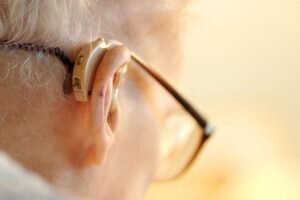Dementia & Hearing Loss
The prevalence of dementia is projected to affect 1 in 85 people by the year 2050, more than 100 million people worldwide. Dementia is a general decline in cognitive abilities such as thinking, memory and language.
Different disease processes can cause dementia:
Alzheimer’s disease
Lewy Bodies disease
Alcoholism
Parkinson’s disease
Vascular diseases
HIV – AIDS
Extra-pyramidal syndromes
Fronto-temporal lesions
Hearing Loss
Hearing Loss and Dementia
Current research indicates that sensory loss, especially hearing loss, are risk factors for the development of dementia. There is an overlap between the symptoms of hearing loss and dementia. Both cause vagueness, misunderstandings, memory loss and social withdrawal.
Hearing loss reduces stimuli input to the brain and hampers social interaction contributing to the development of dementia.
There is a hypothesis that hearing loss and progressive cognitive impairment are caused by a common neuro-pathological process which may be the same that leads to Alzheimer’s disease. Indeed the primary area of the brain affected by Alzheimer’s disease is the mid temporal lobe which is the area where the nerve pathways converge from the ear to the brain.
There is also the likelihood of another neuro-biological process such as vascular disease and factors like smoking and family history of diabetes and hypertension causing both hearing loss and dementia.
Diagnosis of Dementia
There may be an over diagnosis of dementia in individuals affected by hearing loss.
An untreated hearing loss can interfere with the diagnosis of dementia. This is because most diagnostic tests to assess cognitive function rely on verbal communication between the examiner and the patient.
Prior to diagnostic assessment of dementia it is important to rule out sensory impairment such as vision and hearing loss. Treatment of the sensory impairment should always precede an assessment of cognitive function.
In the case of vision impairment appropriate glasses or surgical intervention when applicable should be undertaken.
In the case of hearing loss the appropriate fitting of hearing aids or an implantable device such as cochlear implants should be considered.
Prevention of Dementia
Hearing loss affects cognitive reserve. When auditory perception is difficult greater cognitive resources are dedicated to auditory processing to the detriment of other functions such as working memory. This reallocation of neural resources to auditory processing depletes the cognitive reserve available to other processes leading to the earlier clinical expression of dementia.
Studies suggest that environmental enrichment with access to auditory and environmental stimuli, and engagement in leisure activities, lower the risk of dementia.
The effects of hearing loss in older adults may be preventable and can be practically addressed with current technology (eg, customised hearing aids and cochlear implants) and with other rehabilitative interventions focused on optimizing social and environmental conditions for hearing.
Reference: Frank R. Lin et al Arch Neurol. 2011; 68 (2):214-220.
Contact Form
If you have an enquiry or would like to make an appointment, please call our clinic on (02) 9387 3599. Alternatively, please complete the form below.

